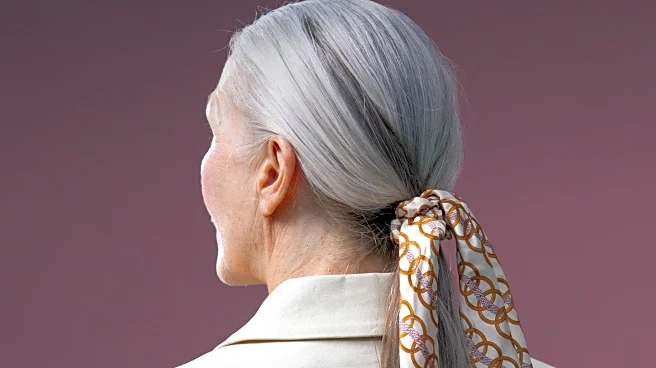What's Happening?
Researchers at The University of Tokyo have discovered a potential link between graying hair and the body's natural defense against skin cancer. The study focused on melanocyte stem cells (McSCs), which
are responsible for pigment production in hair and skin. When these cells are damaged, they may die off, causing hair to turn gray. This process is driven by the p53-p21 pathway, a known tumor suppressant. The findings suggest that graying hair might be a mechanism for removing damaged stem cells before they become cancerous. Dr. David Sinclair from Harvard Medical School, who was not involved in the study, noted that understanding this process could lead to preventative treatments for melanoma and other cancers.
Why It's Important?
The study's findings could have significant implications for cancer prevention strategies. By understanding how the body naturally defends against cancer through processes like hair graying, researchers may develop new methods to prevent melanoma, a deadly skin cancer affecting over 200,000 Americans annually. This research could lead to innovative treatments that leverage the body's natural defense mechanisms, potentially reducing cancer incidence and improving public health outcomes. Additionally, the study reframes the perception of gray hair, suggesting it may be a positive indicator of resilience against disease.
What's Next?
Further research is needed to explore how the body's natural defense mechanisms can be harnessed for cancer prevention. Scientists may investigate how to stimulate or replicate the protective processes observed in the study. This could involve developing treatments that mimic the p53-p21 pathway's effects on melanocyte stem cells. Additionally, public health campaigns might focus on educating people about the potential benefits of graying hair as a natural defense against cancer, potentially shifting societal attitudes towards aging and hair color.
Beyond the Headlines
The study raises ethical considerations regarding the use of natural defense mechanisms in medical treatments. Researchers must ensure that any interventions developed from these findings do not inadvertently harm patients or disrupt other bodily functions. Furthermore, the study highlights the importance of understanding the body's complex biological processes and their implications for health and disease prevention.









